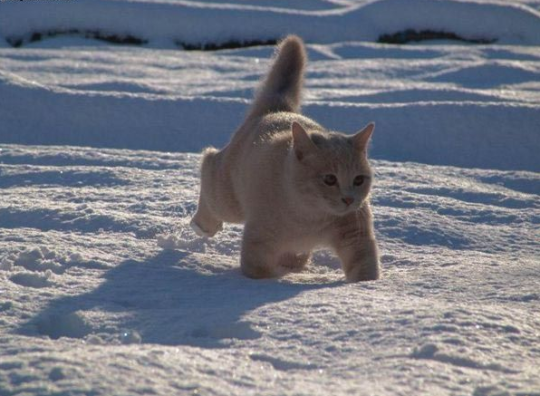Nikki. Australian. Bach of Social Science (Psychology). Studyblr*Langblr*(a little bit)Fitblr. Main @ baycitydreaming Iherb discount - NIK2052
Don't wanna be here? Send us removal request.
Text
Japanese Onomatopoeia: ブツブツ (butsu butsu) - grumbling

If you seen this word on a manga, it means that the person is grumbling. Most of the time it implies that he/she is mumbling about a negative things about something/someone.
Happy learning! 。゚✶ฺ.ヽ(*´∀`*)ノ.✶゚ฺ。
…………………………………………
Links:
• CrunchyNihongo - Easy to Learn Japanese Lessons Site • Get our easy Japan lessons on your facebook timeline
370 notes
·
View notes
Photo


If you want to support A Ringo A Day have a look at my Patreon account: https://www.patreon.com/aringoaday For as little as 2 dollars/month you’ll gain access to THE most in-demand perk ever: your A Ringo A Day posts will also contain their related kanji (as in the above examples)! Pretty cool, uh? <3
2K notes
·
View notes
Text
Been keeping up with WK and KW, not as much as I liked due to lack of time and internet, but life is life.
Been doing a fair bit of anki as well as physical flashcards and should get a fair bit of reading done in the next two weeks.
Going to go see the Pokemon movie tomorrow (ah, the joys of being the only adult in a theatre of children :/) and will be having dinner/karaoke with Japanese people on Saturday.
3 notes
·
View notes
Link
2 notes
·
View notes
Conversation
me: oh yea it's been years I'm over it
also me: *was actually irreparably changed to the point that my personality and the way I interact with others and my insecurities are, even today, a direct result of what happened*
155K notes
·
View notes
Photo

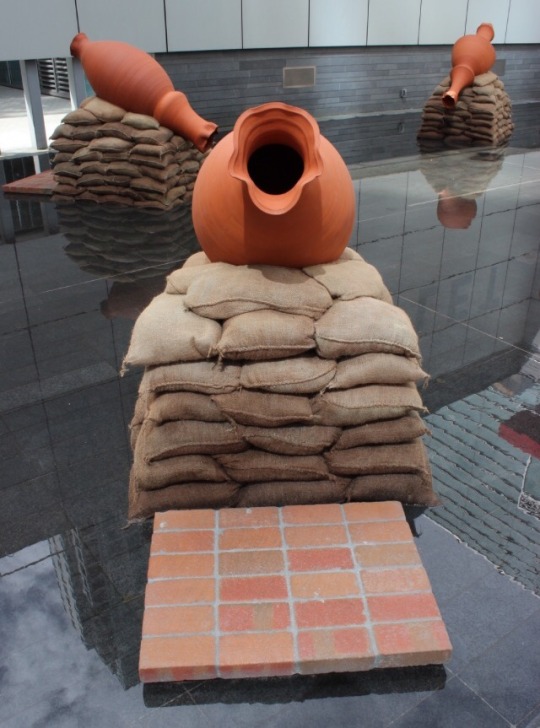
Vessels designed specifically for screaming
Babak Golkar, Time to Let Go, 2014
161K notes
·
View notes
Conversation
me speaking to my cat in a foreign language: *effortlessly uses perfect grammar, advanced vocabulary, flawlessly declines each word without thinking*
me speaking to a native: *forgets how to say "my name is" and accidentally calls their grandmother a crocodile*
1K notes
·
View notes
Text
「Learn Japanese」 Can You Learn Japanese from Watching Anime?
「Learn Japanese」 Can You Learn Japanese from Watching Anime?
youtube
So, you want to know if you can learn Japanese from watching anime. With almost all answers from me, the response is it depends. Yes and no.
We’re in for a long read here, so just to start off, I’m going to shoot out a bunch of yes no answers real quick:
No, you can’t learn Japanese JUST from watching anime (unless you’re some kind of genius).
Yes, you can IMPROVE your Japanese from watching anime
No, you should not speak Japanese like how anime characters do
No, this doesn’t mean you can’t learn other things from anime such as vocabulary terms and grammar patterns
Yes, You can spend years studying Japanese formally at university or any other kind of institution, and still learn things from watching anime, even if it’s just a new vocabulary or common phrase here and there.
Yes, there are certain types or genres of anime much more suited to learning from (romantic comedies set in a school campus are much more friendly than science fiction mecha series with an overload of technical jargon).
Yes anime is cool as hell, no matter how old you become.
And lastly, but most relevantly now: No, watching anime is nowhere near the most efficient way to learn Japanese.
This is where my personal advice comes in:
If you intend to start studying Japanese seriously, as in you have a set goal to be this level within this amount of time or are going to be moving to Japan or anything like that, do not put hard time and effort into trying to learn Japanese from anime. Instead, put that time and effort into studying more educational resources, and the ability to understand the Japanese in anime will naturally come along with that.
This approach that we’re going to talk about should only really apply to people who love anime, watch a lot of it, and want to turn that enjoyable experience into the seeds of an educational opportunity too , even if just super casually at first. For example, maybe you’re in high school right now and plan to take Japanese classes and study it seriously in college, but have a couple of years and a lot of anime you’ll be wanting to watch until then. For example, maybe you’re not invested in learning the language enough to study kanji 2 hours every single day or are too shy to practice speaking to a stranger online for practice. But what you do do is watch an episode of anime every day while eating dinner or something. Even with something as simple as that, that’s 2.333 hours of being exposed to Japanese speech a week. If you been a fan of anime for even just a year, that’s roughly 120 hours total. The idea here is to take advantage of that decent amount of exposure and turn it from Japanese just sounding like an alien language to Japanese being something you’re able to at least make a bit of sense of and in turn have an opportunity to learn some new-say a new word, or phrase, or grammar pattern, from each line of dialogue you hear.
So basically, what you want to do is introduce yourself to the absolute basics of the language and reach a bare minimum level.
And the good news is that if you watch enough anime, it’s already very likely that you’ve done this, just to a lesser degree. Lots of anime fans will know and are likely to never forget the definitions of words like (Ready? Anime word recognition test in 3,2,1…) kanojo, kokoro, suki, baka, kawaii, senpai, tsundere, bakemono, chikara, daijoubu, ganbaru, jigoku, kareshi, mochiron, sasuga, sugoi, tomodachi, etc. despite never having learned hiragana (the Japanese characters) or what sounds the Japanese language even uses. Why? Simply because those words are among the most commonly used words in anime and after you’ve heard them so many times, they’ve become ingrained in your memory. We’re going by the same principle here. We just have to establish the foundation for it to happen for a wider range of words-and even further, for grammar.
And so, the approach that we’re going to recommend for people interested in accomplishing this is to:
Spend a good week or two at least learning the absolute basics of the Japanese language:
The letters, or more correctly termed, characters it uses. While there are three different writing systems for the Japanese language, they all use the same pronunciation, so you theoretically could get by with just learning the first of the three, hiragana, in the beginning. (1-4 days)
After that, you learn the basic sentence structure to Japanese sentences. (1 day)
Then get introduced to word types, adjectives, nouns, verbs, particles, etc. and get an idea of how to distinguish a given word as one of those types. (1-5 days)
So now you might be going, whoa, whoa, whoa, 1-2 weeks to learn all that information? Just because you’re calling it the basics, doesn’t mean it takes that little time to learn.
Well, let’s see if we can boost your confidence a bit by doing a condensed, proportional example version right now and get a glimpse of the process. First, we’ll try to introduce you to the utmost introductory information about each of those subjects, then we’ll jump into an example line from an anime and break it down with just that information.
-We are going to skip hiragana/katakana/kanji because that simply cannot be taught in the span of a few minutes-
Basic Japanese Sentence Structure (loosely the opposite order of English sentence structure):
In English: “I ate a hamburger.” (SUBJECT > VERB > OBJECT)
In Japanese: “Watashi wa hamburger o tabemashita.” 私はハンバーガーを食べました。 (Literal English translation: “I hamburger ate.”) (SUBJECT > OBJECT > VERB) *plus particles after NOUN words to mark them as such, e.g. topic/subject marker particle wa after the noun watashi to mark it as the subject/topic and direct object marker o after the noun hamburger to mark it as the direct object
Japanese Word Types:
Adjectives: 2 Types. What we call i-adjectives (い) and na-adjectives (な). i-adjectives are called that because they end in the i-sound. On the other hand, na adjectives can end in anything and are called that because the character na appears after them when they modify nouns.
Nouns: The most vast word group, these words can end in essentially any character/sound.
Verbs: Also a very vast word group. Has the most forms of conjugation, which take a lot of time to learn but become easier to distinguish once done (e.g. words ending in (ました, ませんでした, etc. are obvious verb words). Generally divided into two sub-groups, ru-verbs and u-verbs, because they end in ru (る) and u (う) respectively. However, this only applies when they are in what is called the Dictionary Form, which is the superficial equivalent of the present/future tense in English.
です (desu) and だ (da): A copula, a word used to link subject and predicate. Usually marks the end of a clause or sentence.
Now, a short and simple line from one of my favorite anime series, One Piece.
ルフィは海賊王になる男だ! “Luffy wa kaizokuou ni naru otoko da!” (Literal translation: “Luffy is Pirate King become man!”) (Proper translation: “Luffy is the man who will become Pirate King!”)
Of course, the English translation of the line right there is going to be something you’ll be given if you’re watching the show with subtitles. The Japanese line we have provided and written out is something you’d have to pick up yourself by ear. It goes without saying that this is why learning at least hiragana would be important.
Now for the analysis. How many of these words in this Japanese line, of the seven, do we recognize with our current knowledge?
(Luffy/ルフィ) = name of character = noun (also appears before subject/topic marker wa, which means it is a subject/topic/noun)
(wa/は) = particle/topic marker
(kaizokuou/海賊王) - one of the words we’re likely to not know as a complete beginner
(ni/に) = particle
(naru/なる) = another word we’re likely to not know as complete beginners, but from what we just learned, we could assume it’s a verb because the ru ending
(otoko/男) = the last of three words here that we’re likely to not know, but we might be able to presume that it’s maybe a noun based on the spelling
(da/だ) = copula to end the sentence.
So, four out of seven. Not bad. This gives us:
“Luffy is [UNKNOWN NOUN] [UNKNOWN VERB] [UNKNOWN NOUN].“
The only verb in the English translation we have available is “become”, so then we now have:
“Luffy is [UNKNOWN NOUN] become [UNKNOWN NOUN].”
We know from Japanese sentence structure that object type words such as direct objects, indirect objects, etc. are positioned before the verb action unlike in English where they appear after the verb.
So this means the word positioned before our verb, naru/なる, is connected to the action. We refer to the English translation and see that that word is “pirate king”. So then we confirm that kaizokuou/海賊王 means “pirate king.”
“Luffy is Pirate King become [UNKNOWN NOUN].”
Which leaves the last unknown word to become the last word left in our English translations, “man.” Thus, otoko/男 means “man.”
“Luffy is Pirate King become man.”
While this is our definitive answer when it comes to meaning, but we do need to naturalize it to make it sounds like proper English.
”Luffy is the man who will become Pirate King.”
In the end, if we didn’t take the time to learn about Japanese sentence structure, verb words, noun words, adjectives, particles, etc. we would not have had any means to engage in this process of elimination and potentially learn 3 new words from one line of dialogue: kaizokuou/海賊王 means “pirate king,” naru/なる means “to become,” otoko/男 means “man.”
Even if you’re not catching the Japanese lines by ear perfectly and are barely only making sense of two of the seven words-say you only heard the “ni naru” part of that sentence, that can still be good for you because it’s reaffirming for you various nuances about the language such as the fact that you use the particle ni with naru to make the grammar pattern that is “to become.” Admittedly, ni naru is perhaps an overly simple example, but there are in fact a lot of verbs out there wherein it’s hard to remember whether to use them with the particle ni/に or some other particle like o/を.
Learning Japanese is a YouTube video series with the sole purpose of providing Japanese lessons online for free for anyone at any level! Find 300+ videos of various topics including grammar, vocabulary, kanji, culture, anime, and more with the link below! https://www.youtube.com/user/learnjapanesebod
Join fellow learners of Japanese on our Discord server community! You can follow the series on Facebook | Twitter for updates as well!
Support Learning Japanese on Patreon! Please consider becoming a patron to support the continuation of this video series and the development of our curriculum! https://www.patreon.com/learningjapanese
This video series is presented by becauseofdreams http://becauseofdreams.com/
57 notes
·
View notes
Text
July 6th - kani wani (one session is usually until i get 100 right) + three sessions of wani kani (all lessons and reviews completed)
July 7th - one lot of wanikani. got bad news from home.
July 8th - kani wani + wani kani x2
July 9th - kani wani + wani kani x2
July 10th - kani wani + wani kani x3
Not as much as I would have liked, thinking about going back to lessons but I’d rather individual lessons and be more speaking focussed (living in a country doesn’t mean you get to speak the language daily - especially when your job is to teach your native language). I have to write a goodbye speech for work so I guess I’ll get on to that, and I reorganised my anki decks and settings today, so I guess it’s something?
#Challenge#Studyblr#Japanese Studyblr#Japanese Langblr#Langblr#Also just because I don't post here doesn't mean I'm not studying#The idea of being held accountable by random internet peeps doesn't do it for me and having to get on a website known for time sucking#when you could be studying instead seems dumb to me :/
0 notes
Photo


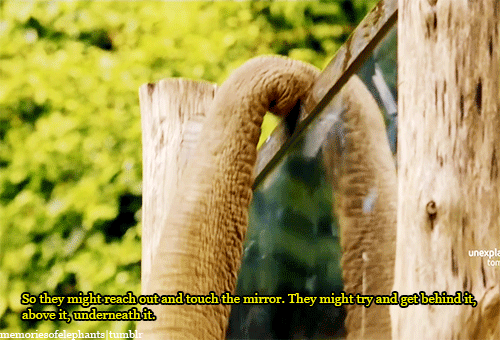
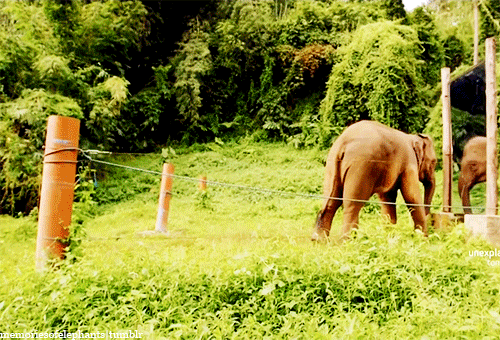
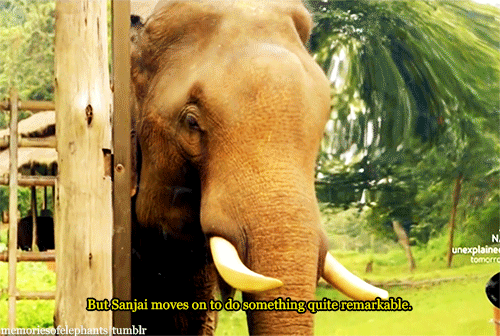

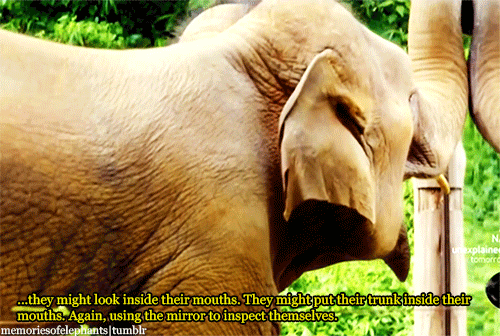
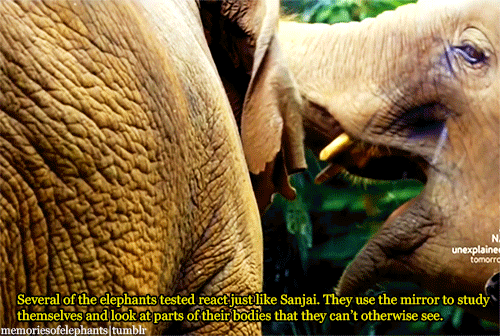
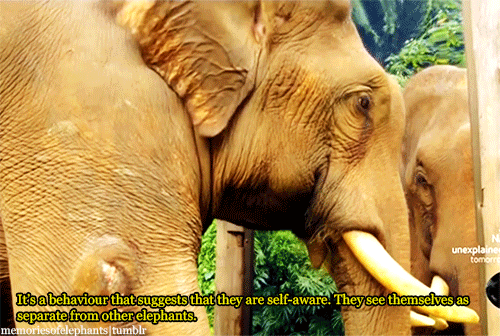
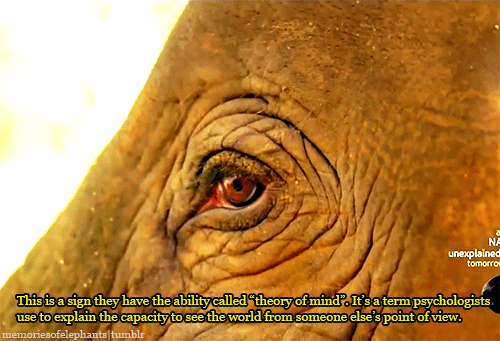
Sanjai, a 20-years old bull (male elephant), sees himself for the first time in front of a mirror. [x]
279K notes
·
View notes
Text
Q. Is there really no such thing as swear words in Japanese?
youtube
A. No. There is such a thing as swear words in Japanese, but the “profanity” often heard on Japanese TV isn’t the same kind of profanity as English swear words because they’re not considered “taboo” language.
If you watch a decent amount of Japanese TV such as anime, movies, live-action dramas, etc., you might have noticed that a lot of times subtitles will translate the dialogue to include English profanity or cussing, like the words “shit,” “fuck,” “bitch,” etc.. You might in turn then be wondering if these are accurate translations, because surely the Japanese-equivalent of these words wouldn’t be a part of something like an anime or TV show meant for kids airing in the middle of the day.
This will be the context for this lesson.
Perhaps the simplest way to distinguish between profanity in English and profanity in Japanese is that in English swear words have a double-function of being harsher (or cooler) than normal language and being taboo. And as you can probably already tell, the coolness or the harshness is something that directly derives from the fact that the words are considered inappropriate/taboo. Calling someone “a fucking idiot” as opposed to “a complete idiot”-despite the fact that they both mean the same thing, is way harsher or cooler because the word “fuck” is considered inappropriate/taboo.
Japanese profanity for the most part does not have this double-function. It separates the two functions into two different realms.
It has taboo words but they are scarce, represent a minority of “Japanese profanity,” and you’ll pretty much never hear someone say them in public, even if they’re adults. These will be words such as racially discriminatory terms or perhaps the most infamous example: the Japanese word for vagina. The thing to point out regarding this minority is that they’re typically used for literally cursing someone and do not become flexible like English swear words in which you can say something like “fucking X” or “piece of shit X,” wherein you add on the swear to any given statement to make it sound harsher/cooler overall.
The same pretty much goes for the other way around in that there are also ways the Japanese language makes things sound harsher or more aggressive, but these words won’t be taboo. In fact, most of the time, it won’t even be the actual words but rather the grammar of the entire speech that makes a statement insulting/harsh in Japanese.
If you aren’t a complete beginner of the Japanese language, you’ll know that it has a pretty extensive system of enforcing grammatical specifics like conjugating words a certain way to maintain your speech as-say: polite, formal, honorific, humble, casual, etc. For better or for worse, simply not using polite language to someone in Japanese could be considered insulting enough. This inherent cultural and linguistic difference between Japanese and English in turn influences the way speakers of those respective languages “swear.”
To exhibit this, see the following examples of common Japanese “swearing” and how they are actually words you could perfectly use in formal, real-life conversations, but once you “grammatize” them a certain way they become full-on insulting and frowned upon.
Example(s):
糞 (くそ/kuso) Definition: “feces, excrement, dung, poop, bullshit, shit, damn” This is considered a swear when it is said alone and likened to the English exclamation of “Shit!” or “Damnit!” But the word itself is not profane at all, as shown by the following perfectly normal compound words that contain it.
糞虫 (くそむし/kusomushi) “dung beetle”
鼻糞 (はなくそ/hanakuso) “booger, snot, mucus, nasal discharge”
糞食らえ (くそくらえ/kuso kurae) “eat shit!” In this example, it returns to being part of a swear but it still is not because the word 糞 (くそ/kuso) itself is considered profane. Instead, it is the imperative/command form of the verb 食らう that makes this statement insulting.
糞餓鬼 (くそがき/kusogaki) “piece of shit brat, son of a bitch” Another example of it being a part of a swear because the overall statement is offensive
ふざけるなよ! (fuzakeru na yo!) “cut the shit! stop fucking around!” This derives from the perfectly normal verb word 巫山戯る (ふざける/fuzakeru), which simply means “to fool around, to joke around, to kid around, to jest, to screw around, etc.” It becomes an offensive swear not because the word itself is profane but because the casual verb conjugation of it is considered rude. (ふざけんな! would be even stronger with its even shorter/slang-ish form.) Alternatively, if we were to conjugate it into the more polite, て-Form + 下さい to mean “please do VERB,” then it would become ふざけないで下さい and would be a perfectly okay statement to say in a real life conversation without insulting someone, translating to “please stop fooling around”
うるさい (urusai) Literal definition: ”noisy, loud“ Likelier English translation (due to how rude it is to be telling someone straight to their face that they are being loud): “Be quiet! Shut up!”
どけ! (doke) Literal definition of original verb word 退く: “to step aside, to move, to make way” Likelier English translation (again, due to the imperative command form verb conjugation that expresses aggression): “Get out of my way! Fuck off!”
くたばれ! (kutabare) Literal definition of original verb くたばる: “to kick the bucket, to drop dead, to die, to croak” Likelier English translation (again, due to the imperative command form verb conjugation that expresses aggression): “Drop dead! Go to hell!“
Exception Example(s): These word(s) are both insulting/offensive and considered taboo.
手前 (てめえ/temee) Definition: "you” (used when the speaker is extremely angry and implies that the addressee is of an inferior stature, therefore it is usually translated into English to something along the lines of “bastard, motherfucker, etc.” instead)
Conclusion: While there is such a thing as Japanese profanity, it is very different from English profanity. English profanity is more imaginative, colorful, and has something of a subculture to it, in which new profane, slang words are being termed pretty much everyday (e.g. fuckboy, asshat, dickweed, cumswallow, cocknose shitbucket, etc.). Japanese profanity for the most part consistently derives from the technical points of its grammar due to the language being influenced by Japanese polite culture.
✧¸¸.•*¨*• •*¨*•.¸¸✧
Learning Japanese is a YouTube video series with the sole purpose of providing Japanese lessons online for free for anyone at any level! Find 300+ videos of various topics including grammar, vocabulary, kanji, culture, anime, and more with the link below! https://www.youtube.com/user/learnjapanesebod
Join fellow learners of Japanese on our Discord server community! You can follow the series on Facebook | Twitter for updates as well!
Support Learning Japanese on Patreon! Please consider becoming a patron to support the continuation of this video series and the development of our curriculum! https://www.patreon.com/learningjapanese
This video series is presented by becauseofdreams http://becauseofdreams.com/
3K notes
·
View notes
Text
July 5th - three sessions wanikani, one session kaniwani, organised study desk (for studying only) and the order I want to study materials in
Honestly zonked this week, it’s a struggle just to get up in the morning and make it through the day. Summer holidays are around the corner though!
1 note
·
View note
Text
July Check In
I saw there was some type of challenge? where you’re meant to write a goal of how much to study etc over July and be accountable or w/e
I’m just gonna write what I do each day. Immersion is a big factor for me, obviously, but I don’t count that as study, since it’s just daily life.
July 1st - took three mock JLPT quizzes, read over Genki, finished listening to Nihongo no Mori playlists
July 2nd - JLPT, small practice test
July 3rd - no study, remade study goals/plans/habit tracker
July 4th - two session of WaniKani, one of KaniWani
1 note
·
View note
Text
Took JLPT N3 on Sunday, think it went okay.
Took a train to the venue, planned to study but that train line always makes me feel kinda ill for some reason, so I kinda napped a little? Had some lunch and crammed, so a friend’s teacher which was okay but also not good since I didn’t tell anyone I was taking the test in case I failed :/
Girl in front of me in the test didn’t finish on time and kept trying to write answers. Idk why but all the people from the Philippines/Vietnam/etc immediately start talking once the test finishes even though the tests haven’t been collected. Happened last year too. Cultural differences?
(Un?)fortunately met someone from my town and his two friends on tram ride back to station. He just wanted a free English lesson. His friends took the cheap train home but he decided to take the expensive one home with me. That’s fine, but it was 20 questions a minute about shit like racism, religion and so on. Boy, I’ve been up since 6am, surviving on 5 hours sleep a night on the floor for the last two weeks and also still having a cold. I don’t want to have these convos after a 4 hour exam and with someone I just met.
After, we parted at the station but then he was all ‘oh, I’m going this way too’, but not until I was halfway down the street, so he ran to catch up, which was weird. I headed to a conbini, and by the time I was leaving, he was lurking inside the entrance. He’s added me on facebook, but I honestly don’t think I want to add him. I’m all for being nice and making friends, but there was just too much going on and I’m not really good at saying ‘hey, slow down’ or ‘let’s talk about something else’ without sounding bitchy af :/
0 notes
Quote
おい、スティーヴ!お前はもうずいぶん長く日本に住んでいるんだから、そろそろ日本の習慣とかに合わせたほうがいいんじゃないのか?好き嫌いは止めて、魚も食べるようにしろよ! Hey, Steve. You’ve been living in Japan for a pretty long time now so don’t you think it’s time for you to adjust to Japanese customs? Stop being so picky and start eating fish.
WaniKani calling me out .///.
#WaniKani#Studyblr#Japanese Studyblr#Japanese Langblr#Langblr#I'm better at eating fish now but... ew
0 notes

